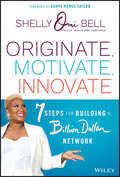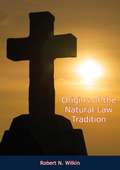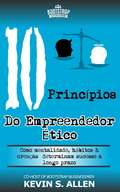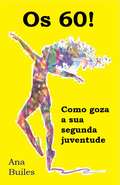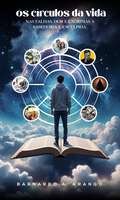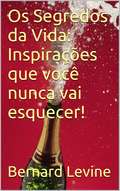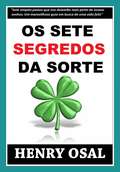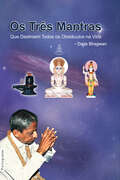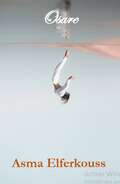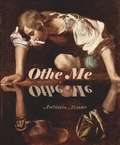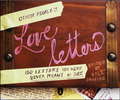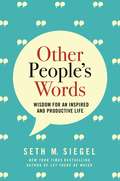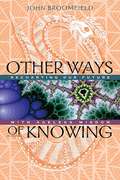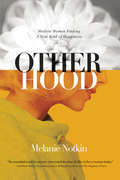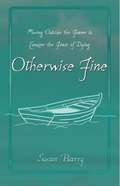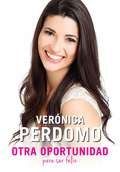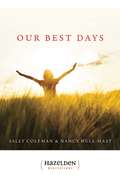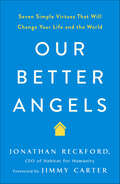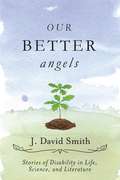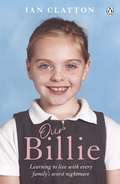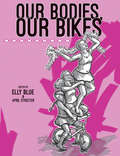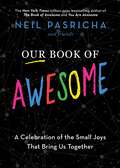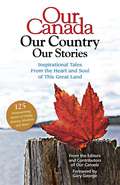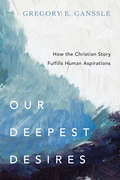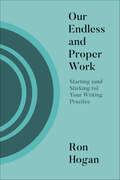- Table View
- List View
Originate, Motivate, Innovate: 7 Steps for Building a Billion Dollar Network
by Shelly Omilade BellSupercharge your business or career by staying true to your authentic self In Originate, Motivate, Innovate: 7 Steps to Building a Billion Dollar Network, accomplished entrepreneur Shelly Omilâdé Bell and author Sheena C. Howard deliver an honest and engaging discussion of how to think differently about getting your business funded as a female entrepreneur of color. In the book, you’ll find the mindsets, tools, tactics, and strategies you need to succeed in a venture capital environment that is largely designed by—and for—white males. You’ll learn how to apply your own unique story and background and prioritize valuable relationships to create your own pathway to a fully funded business. You’ll also discover: An acknowledgment and highlighting of those obstacles that remain in place and stand in the way of women of color in business How to break through those obstacles while doing things your own way Strategies for achieving your next goal, whether that’s building a business, creating social impact, or looking for a raise An essential and insightful resource for entrepreneurs, founders, and other business leaders of color, Originate, Motivate, Innovate is the no-nonsense, hands-on book that professional women of color have been waiting for.
Origins of the Natural Law Tradition
by Robert N. Wilkin Thomas E. Davitt John S. Marshall“CONCEPTS of a Law of Nature are as old as Western philosophy. From its inception Greek philosophy was concerned to reduce the apparent chaos and conflict of the visible world to some principle of harmony and order. The true relationship of man to the world about him was of primary concern. Philosophical solutions of these problems were found in concepts of Natural Law by which men could be brought into an ideal relationship with each other and with their environment.“In selecting the four theories of Natural Law it was thought advisable to explore only concepts of Natural Law as a manifestation of universal order, leaving for the future the subsidiary notions of Natural Rights developed in more recent centuries. The four theories have been presented in terms of their principal expositors: Cicero, with his transcending synthesis of the Aristotelian man and the Stoic cosmology; St. Thomas Aquinas, with his Hellenized adaptation of traditional Jewish-Christian theology; Richard Hooker, who provided an intellectual bridge between the neoclassical Natural Law of Bracton, of John of Salisbury, and of Anglican theology, and the rationalist Natural Rights doctrines of the seventeenth century; and Herbert Spencer, who constructed a sort of Natural Law on the basis of the natural laws of biological existence as propounded by Charles Darwin.” (From the Introduction by Arthur L. Harding)
Os 10 Princípios do Empreendedor Ético
by Kevin S Allen Tatiana El-Id KanhoucheConsiderando os milhares de livros sobre empreendedorismo disponíveis no mercado, o que faz “Os 10 Princípios do Empreendedor Ético” diferente? A maioria desses livros está cheia de truques para enriquecer rápido e esquemas para ganhar dinheiro rápido. No entanto, esse livro não tem essas características. Eu vou te ensinar a criar e desenvolver um negócio com honestidade, integridade e foco no cliente, e não apenas no dinheiro. Os princípios citados nesse livro vão ensinar como ser honesto, autêntico e verdadeiro com você mesmo e seus clientes, se implantar e segui-los diariamente. Ser honesto é uma das principais características de um empreendedor, na verdade de qualquer pessoa, mas muito difícil de encontrar hoje em dia. Ser um empreendedor é incrível, tempo, liberdade, dinheiro, viagens, que às vezes nos esquecemos o motivo pelo qual começamos: servir às pessoas. Nos perdemos na busca por dinheiro e esse livro vai lhe ajudar a ser o empreendedor honesto, autêntico e confiável que sempre quis ser.
Os 60!: Como gozar a segunda juventude
by Ana BuilesComo goza a sua segunda juventude. Manual para viver melhor depois dos 60 anos; a segunda juventude. Hoje vivemos facilmente até aos noventa anos. Trinta anos mais que os nossos pais. Quando passamos pelos trinta, a sociedade condiciona-nos para sentirmo-nos jovens. Ao chegar aos sessenta estamos pisando os segundos trinta, que correspondem a uma segunda juventude. Mas chegamos a esta segunda juventude com duas grandes vantagens: estamos mais inteligentes e focados; além disso o caminho percorrido e as experiências vividas, fazem-nos pessoas mais sábias, o nosso potencial energético equilibrado e fluido. Temos a nosso favor o tesouro da síntese, a tranquilidade e confiança do conhecedor é um grande capital invisivel com o que contamos. Mas para aproveitá-lo, que necessitamos?
Os Circulos Da Vida: NAS FALHAS, DOR E LÁGRIMAS A SABEDORIA É ESCULPIDA
by Bernardo A. ArangoEste livro é uma viagem fascinante à própria essência do ser e da existência humana. No teatro existencial da vida, somos os protagonistas do nosso filme, enfrentando emoções, desde a alegria, a decepção, o amor, o ódio, a morte, Deus, o ateísmo e a tristeza. A pandemia global revelou a nossa fragilidade e a importância das nossas ligações. Somos uma espécie poderosa, mas altamente destrutiva, cegada pela ignorância, destruindo a nós mesmos e a tudo o mais. No entanto, este livro não pretende mudar o mundo, mas sim mudar a nossa percepção dele e encontrar o equilíbrio na nossa existência. Através da neurologia, da psicologia, da ciência e da espiritualidade, somos convidados a uma jornada de autodescoberta e busca de bem-estar. A obra destaca a importância de nos conhecermos e curarmos feridas emocionais, nos libertarmos da ignorância e encontrarmos um propósito que ilumine a nossa existência. A introdução nos imerge na responsabilidade de cada ser humano em encontrar sua identidade e missão em meio à complexidade do mundo moderno. A pandemia, embora desafiadora, nos dá a oportunidade de descobrir o nosso verdadeiro propósito. O livro aborda temas cruciais como ignorância, egoísmo, ódio, objetivos e amor verdadeiro, incentivando-nos a romper com o conhecido para compreender o nosso propósito de vida. Cada um de nós tem um propósito único, e este livro propõe uma análise cronológica profunda para compreender que viver é um desafio, não uma tragédia. Nas suas palavras finais, convida-nos a sermos participantes ativos no livro, em vez de apenas leitores, explorando as nossas experiências e reflectindo sobre o nosso mundo. Este livro não é apenas um apelo cientificamente fundamentado ao autoconhecimento e à cura emocional e interior, mas também um guia para desenvolver um nível mais elevado de conhecimento, consciência e potencial espiritual. “Os Círculos da Vida”
Os Segredos da Vida: Inspirações que você nunca vai esquecer!
by Bernard Levine Vanessa Prestes SoaresNós chegamos a um parque e Aubrey parou o carro dele em um ponto de ônibus coberto. Lá estavam três pedintes, ou melhor, mendigos, vestidos como você geralmente os encontra, com roupas sujas, rasgadas e cabelo despenteado. Aubrey os chamou: -- Olá, a manhã não está linda? Tenho certeza que vocês estão todos com muita fome... por que vocês não entram no carro e eu levo vocês para tomar um bom café da manhã? Eles simplesmente olharam para nós e, então, desviaram o olhar. Não tivemos resposta dos três pedintes. Aubrey deu a volta no parque e parou em outro ponto de ônibus coberto... Lá estava um pedinte deitado naquele banco de madeira duro. Aubrey cumprimentou o pedinte: -- Que manhã linda esta... Eu quero te dar um bom café da manhã, alguma comida boa, vamos... Entre no meu carro! Dessa vez, Aubrey teve sucesso. O pedinte abriu a porta, entrou no carro do Aubrey e nós fomos para a dele. Quando chegamos, Aubrey deu ao pedinte um sabonete, uma toalha de banho, um shampoo, um tubo de pasta de dente com uma escova, além de um pente e um aparelho de barbear. -- Tem um banheiro... Enquanto você toma banho, meu amigo Bernard e eu vamos preparar o café da manhã... venha para a sala e jantar quando estiver pronto! Eu fiquei muito surpreso... -- Aubrey, como você deixa um cara completamente estranho que você buscou na rua ficar sozinho no seu banheiro? E se ele entrar no seu quarto e roubar alguma coisa? Você nem conhece ele!... E a possibilidade de pegar uma doença? Você deu a ele a sua toalha e seu sabonete sem ao menos saber se ele está sofrendo de algum mal?
Os Sete Segredos Da Sorte
by Henry Osal Elaine Rosa DefendiSete passos simples que irão nos levar para mais perto de nossos sonhos. Um guia maravilhoso para uma vida feliz.Quando encontro pessoas que se sentem com sorte, as pessoas a quem a fortuna sorriu em algumas ou várias ocasiões, eles geralmente concordam em uma coisa: a sorte ou a fortuna não vieram por acaso.A sorte exige perseverança, entusiasmo e trabalho duro para se reconciliar conosco, ou seja, é preciso colocar esforçar-se para atraí-la para nossas vidas.Podemos identificar a SORTE como um golpe que nos chega uma vez na vida e perdemos todo o nosso tempo esperando por esta colisão, uma abordagem que na maioria dos casos é ineficaz.Nós tendemos a pensar em nossa ESTRELA DESAFORTUNADA quando nós, atordoados, vemos as notícias sobre pessoas felizes, que ganharam na loteria; encontraram petróleo embaixo de suas fazendas ou tiveram uma criança superdotada que os tornaram milionários. Estes são casos excepcionais.No entanto, nós não agradecemos à nossa ESTRELA DA SORTE quando vemos ou lemos notícias trágicas. Parece apenas que isto não pode acontecer conosco. E a probabilidade de que, por acaso, algo realmente bom nos aconteça é a mesma de que algo muito ruim nos aconteça: MUITO RARA.Então, vamos começar a pensar na sorte como algo que podemos controlar, como um caminho que podemos escolher, para alcançar um objetivo. Isto exige atenção a uma série de regras, que tenho chamado de SEGREDOS, embora na realidade estejam apenas carregados de senso comum.Vamos trilhar juntos este caminho.
Os Três Mantras
by Dada BhagwanAs religiões desse mundo preservam o conhecimento e protegem os segredos dos antigos e poderosos mantras. No coração da religião desse mundo, e entre os mantras mais poderosos da história da religião, está o mantra Navkar, ou Trimantra. No livro “Trimantra”, Gnani Purush (personificação do autoconhecimento) Dada Bhagwan explica o Trimantra, seu significado e os benefícios extraordinários de recitá-lo. Aquele que desejar viver sem se preocupar enquanto enfrenta problemas na vida cotidiana, que quer saber como obter paz interior ou aquele que está em uma busca espiritual ou na busca da iluminação (auto-realização), a utilização do Trimantra fornece tudo isso - e muito mais. Entre os muitos livros espirituais disponíveis hoje, a orientação espiritual de Param Pujya Dadashri sobre o valor do Trimantra é a melhor maneira de acessar seu poder espiritual, e isso é inestimável.
Osare
by Asma ElferkoussFate fatica ad attribuire a voi stessi il giusto valore? Non vi sentite in grado di poter andare avanti? Vi manca il coraggio per realizzare i vostri sogni e obiettivi? Credere in sé stessi è la chiave della propria felicità! Osare: un libro che vi fa bene, un invito alla speranza e un appello all'audacia
Other Me: A autoscopy about the reality of lide and the conception of the self.
by Antonio AlmasAnd then it came the time for silence; it had to come one day, because too many words disorders the mind, too much talking exhausts your head, overwhelm your senses and strays you from what's essential. I know that I attempted to run, that I couldn't accept loneliness and the absence of noise. I struggled to keep myself among others, to be like them, to have lots of friends, to go to lots of parties and feel lots of joy, but that was not who I was. I was a tiny, quiet person, who always wanted to be on their own, shut into their own world, in silence, hidden inside their own brain. I never had the hang for being public, even though I had such ability for argumentation. When I first started in the political arts, I felt uncomfortable with all the lies, the need for constantly being under the sight of the people, under the scrutiny of others; I was never into being scrutinized. Not sure if it's for fear, although, yes, I've always been afraid of everything, of being wimpy, of not being as good as the others. I always use others in a comparative way, after all, that's the way it is, we're always pointing out differences between ones and others, fighting to surpass the others instead of helping each other. In sum, a young one with inferiority complexes can only grow into an adult filled with insecurity, who, besides their obstinacy for an independent life and paying your own bills, has left behind a few fragilities which, apparently, weren't so evident though equally serious; as serious as those of who could not be in charge of building a solid, stable life.
Other People's Love Letters
by Bill ShapiroFevered notes scribbled on napkins after first dates. Titillating text messages. It's-not-you-it's-me relationship-enders. In Other People's Love Letters, Bill Shapiro has searched America's attics, closets, and cigar boxes and found actual letters-unflinchingly honest missives full of lust, provocation, guilt, and vulnerability-written only for a lover's eyes. Modern love, of course, is not all bliss, and in these pages you'll find the full range of a relationship, with its whispered promises as well as its heartache. But what at first appears to be a deliciously voyeuristic peek into other people's most passionate moments, will ultimately reawaken your own desires and tenderness...because when you read these letters, you'll find the heart you're looking into is actually your own.* "i think UR great. wanna have wine & Tequila again sometime?"* "I can't believe you're real, and I think about you constantly in some way or the other all day. I haven't given the finger to anyone driving since I met you."* "With you I learned how to fight cleaner, how to talk things out better, and how to make a strong loving family out of nothing. These are priceless gifts that I will carry with me the rest of my life. One more thing you did for me: you left, and I had to get through it."* "P.S. I look forward to your letters too much to call. Also, where do you stand on chains?"From the Hardcover edition.
Other People's Words: Wisdom for an Inspired and Productive Life
by Seth M. SiegelWe all need inspiration. Other People's Words delivers it.When we are confused or sad, lonely or angry, or simply in need of a boost in a relationship or in our life goals, each of us can be uplifted by the wisdom of others. New York Times bestselling author Seth M. Siegel has spent a lifetime collecting quotations that can guide us through virtually every life challenge and experience. The result is Other People's Words, a must-have collection that belongs in every student’s dorm room, every executive’s office, and on everyone’s night table.With nearly 1,200 quotations from more than 700 sources organized into 200 categories within 11 thematic areas, anyone of any age can be motivated by the insights found in this uplifting book. Other People's Words brings together moving, beautifully worded ideas from the ancients to the moderns and from the famous to the unknown to motivate, to teach, to heal – and to inspire.Other People's Words will be an enduring source of guidance for family, friends, graduates, co-workers, and retirees. Indeed, for all of us.
Other Ways of Knowing: Recharting Our Future with Ageless Wisdom
by John BroomfieldA powerful exploration of diverse world views long ignored by the Western world that suggests possible solutions to the environmental and social problems that face us in the next millennium. Our civilization is in crisis. Overpopulation and overconsumption have jeopardized our survival and the great promises of technology have resulted in environmental disaster. This situation, says author John Broomfield, results from the serious error the Western world makes in equating one way of knowing with all ways of knowing--mistaking a thin slice of reality for the whole. Broomfield argues that the necessary wisdom to chart a new course is available to us from many sources: the sacred traditions of our ancestors; the spiritual traditions of other cultures; spirit in nature; feminine ways of being; contemporary movements for personal, social, and ecological transformation; and the very source of our current crisis, science itself. Other Ways of Knowing shows us the wisdom of other cultures who may hold the knowledge necessary to arrest our headlong race toward destruction. From the ancient Polynesian navigational technique of remote viewing to the formative causation theory of Rupert Sheldrake, Other Ways of Knowing examines perceptions and practices that challenge the narrow perspective of the Western world and provide answers to the complex questions that face us as we move into the next millennium.
Otherhood: Modern Women Finding A New Kind of Happiness
by Melanie NotkinMore American women are childless than ever before-nearly half those of childbearing age don't have children. While our society often assumes these women are "childfree by choice," that's not always true. In reality, many of them expected to marry and have children, but it simply hasn't happened. Wrongly judged as picky or career-obsessed, they make up the "Otherhood," a growing demographic that has gone without definition or visibility until now. In Otherhood, author Melanie Notkin reveals her own story as well as the honest, poignant, humorous, and occasionally heartbreaking stories of women in her generation-women who expected love, marriage, and parenthood, but instead found themselves facing a different reality. She addresses the reasons for this shift, the social and emotional impact it has on our collective culture, and how the "new normal" will affect our society in the decades to come.Notkin aims to reassure women that they are not alone and encourages them to find happiness and fulfillment no matter what the future holds. A groundbreaking exploration of an essential contemporary issue, Otherhood inspires thought-provoking conversation and gets at the heart of our cultural assumptions about single women and childlessness.
Otherwise Fine: Moving Outside the Frame to Conquer the Fears of Dying
by Susan BarryThe "worm at the core" is what William James called the fear of dying in each of us. Otherwise Fine treats the myriad forms of this fear, particularly those heightened in our prime middle years of good health. These can be more acute in Late-or-Never-Bloomers, those who suffer the "Blew-It Anxiety" of unmet potentials or the misfortune of circumstances, inauthentic or diffused identities; as well as those with skeptical or quasi-afterlife beliefs. Also offered are four guideposts for weathering the dying stage itself, and a look beyond it.
Otra oportunidad: para ser feliz
by Verónica PerdomoLa experiencia en primera persona de la modelo que sufrió un A.C.V. ytres años más tarde, con una recuperación sorprendente, se convirtió enuna de las favoritas de «Bailando por un sueño», el programa conducidoMarcelo Tinelli. Una historia de vida y autosuperación conmovedora. «Aprendí que hay que disfrutar el día de hoy. Nunca la felicidad escompleta, pero se puede salir adelante», dice Verónica Perdomo.En julio de 2009 Verónica tuvo un A.C.V. (accidente cerebrovascular) delcual solo una de cada tres personas se recupera. El hemisferio izquierdode su cerebro, que controla el lenguaje, la memoria y gran parte de lasfunciones cognitivas, fue el más afectado. Milagrosamente logródespertar, pero durante su lento proceso de recuperación tuvo queatravesar otros dos duros momentos: la pérdida de su padre y de suhermano. Pese a todo, es dueña de una fortaleza y de una alegría que secontagian a los que tienen la oportunidad de conocerla, y que encuentranen ella un modelo a seguir, un ejemplo de lucha y autosuperación.Este libro es una invitación a reflexionar sobre cuáles son las cosasque realmente nos importan, nuestros sueños impostergables, aquello quemantiene vibrando nuestros corazones y nos impulsa a sortear día trasdía los obstáculos de la vida.
Our Best Days
by AnonymousA daily meditation book for adolescents, Our Best Days offers support on issues such as responsibility, family members, peer pressure, and relationships.
Our Better Angels: Seven Simple Virtues That Will Change Your Life and the World
by Jonathan ReckfordInspiring and insightful, Our Better Angels: Seven Simple Virtues That Will Change Your Life and the World celebrates the shared principles that unite and enable us to overcome life’s challenges together.“When the waters rise, so do our better angels.”—President Jimmy CarterJonathan Reckford, the CEO of Habitat for Humanity, has seen time and again the powerful benefits that arise when people from all walks of life work together to help one another. In this uplifting book, he shares true stories of people involved with Habitat as volunteers and future homeowners who embody seven timeless virtues—kindness, community, empowerment, joy, respect, generosity, and service—and shows how we can all practice these to improve the quality of our own lives as well as those around us.A Vietnam veteran finds peace where he was once engaged in war. An impoverished single mother offers her family’s time and energy to enrich their neighbors’ lives. A Zambian family of nine living in a makeshift tent makes room to shelter even more. A teenager grieving for his mother honors her love and memory by ensuring other people have a place to call home. A former president of the United States leads by example with a determined work ethic that motivates everyone around him to be the best version of themselves.These stories, and many others, illustrate how virtues become values, how cooperation becomes connection, and how even the smallest act of compassion can encourage actions that transform the world around us. Here are tales that will make readers laugh and cry and embrace with passion the calling of our better angels to change the way we take care of ourselves, our families, our communities, and the world.
Our Better Angels: Stories of Disability in Life, Science, and Literature
by J David SmithDo children and adults with disabilities enrich our lives? Far more than most people imagine.Our Better Angels is a testament to the value of individuals with disabilities and the value that society could derive from being more welcoming to and inclusive of them. The reward is the powerful humanizing influence that they can have on others-even some of the most hardened people among us.Colorful, real-life examples illustrate how a disability can be a valuable human attribute, a powerful source of compassion from which everyone can benefit.What are the challenges that face us as we strive for a more inclusive society? What are the values that should guide us in our efforts? Smith approaches these questions by examining his own experience and other unique perspectives: Meet the children and adults with disabilities who have touched his own life Consider what science-and pseudoscience-has said about disability View disability through the lens of history and literatureThe result is a compelling case for understanding and celebrating human diversity. Smith asks us to summon the "better angels" of our character and affirm our commitment to a society based on equality and democracy.
Our Billie
by Ian Clayton'An astonishing work' - Joanne HarrisEvery parent's worst nightmare became a reality for Ian Clayton. On a short holiday break in Hay-on-Wye he took his nine-year-old twins canoeing, and in a freak accident his daughter Billie was drowned. In a remarkably frank and vivid way Clayton describes what happened on that spring day, his desperate attempts to save his two children, and then what it felt like two years later to come face to face with the men who hired out the canoe.But Our Billie is not a story of bitterness and recrimination. Instead it's the story of how a family attempts to come to terms with something which makes no sense at all. Through his memories of Billie and his wonderfully affectionate portrait of the small town in Yorkshire where the family has lived for generations, he weaves a story of loss and remembering, of gratitude and forgiveness.
Our Bodies, Our Bikes (Bicycle Ser.)
by Various AuthorsThis book collects many voices, mostly women, talking about and illustrating their experience at the intersection of bicycling and gender. None of us are doctors and we don't intend to give you medical advice. Likewise, we don't advocate doing anything that isn't legal where you are or safe by your own judgement. Please enjoy the book and go out and do what's right for you.
Our Book of Awesome: A Celebration of the Small Joys That Bring Us Together
by Neil PasrichaWelcome to Our Book of Awesome, a celebration of the small joys that bring us together.In a world that is often overwhelming, it&’s time to return to the simple things, the AWESOME things, all around us...if only we take a moment to see them: -Carrying the ice cube tray from the sink to the freezer without spilling -Finally unsubscribing from that annoying email you&’ve been getting forever -Seeing your parents dance -Adding a gift note to yourself on your online order -Sending a private message during the video conference and then seeing your coworker look down and silently smirk -When your kids don&’t hear you opening a bag of potato chips -When the hand sanitizer isn&’t that extra slippery kind that never dries -Texting your husband to do something when he&’s upstairs and you&’re downstairs -When the cake plops flawlessly out of the pan These are just a few of the hundreds and hundreds of things you&’ll find in this new volume. You&’ll also find comments, letters, and submissions from the AWESOME community around the world, leading to a final cacophony of awesome, by all of us, for all of us. Our Book of Awesome is an injection of joy, a heartfelt gift, and a smacking high five for humanity. Read it to be reminded of the endless AWESOME things that give laughter and happiness to our beautiful and brief lives.
Our Canada Our Country Our Stories
by Our Canada Magazine a Division of Reader's Digest Gary GeorgeAn inspirational collection of stories from Our Canada magazine submitted and told by Canadians. Let’s shine a spotlight on the talents and good works of everyday Canadians across the country, drawing upon material from the following magazine departments: Showcase, Cause for Applause, Crafty Canadians and Canadians Abroad. A blend of first-person stories, accompanying photos, and sidebar highlights/factoids on related fields of endeavour. Stories will be pulled directly from our most popular sections of the Our Canada magazine: Showcase: Celebrates the talents of everyday Canadians—from painters, dancers and singers to acrobats, deep-sea divers, racecar drivers and more. Valour: True stories that commemorate the sacrifices of our brave men and women in uniform. Produced in association with Veteran Voices of Canada along with Special Remeberance pages. Cause for Applause: A nod to “good works” and deeds that benefit others. Crafty Canadians: Arts and crafts, from the traditional to the avant-garde. Canadians Abroad: Ex-pat Canadians tell us where they’re at and what they’re up to. Community: Canadians celebrate their communities, lifestyle, passion, culture, and inclusivness. Adventure: From camping on the tundra to motoring cross-country, here are tall tales for the adventurer.
Our Deepest Desires: How the Christian Story Fulfills Human Aspirations
by Gregory E. GanssleAs human beings, we are created with desires. We all long for meaningful relationships, lives that reflect goodness, engagements with beauty, and the freedom to pursue our lives with integrity. But where can our restless hearts find fulfillment for these universal longings? Philosopher and apologist Greg Ganssle argues that our widely shared human aspirations are best understood and explained in the light of the Christian story. With grace and insight, Ganssle explains how the good news of Jesus Christ makes sense of—and fulfills—our deepest desires. It is only in the particular claims of the Christian faith, he argues, that our universal human aspirations can find fulfillment and our restless hearts will be at peace.
Our Endless and Proper Work: Starting (and Sticking To) Your Writing Practice
by Ron Hogan&“The most thoughtful, engaging, encouraging book I&’ve ever read about how hard it is to be a writer and why you should do it anyway.&” ―New York Times bestselling author Sarah Knight of the No Fucks Given guides Writer and editorial consultant Ron Hogan helps readers develop an ongoing writing practice as an end in and of itself, not a means to publication. Many people pick up the guitar without eyeing a career as a professional musician, or start painting without caring if they get a gallery. But with writing the assumption seems to be that the goal must be to get published. Why? Why is it acceptable to attain technical proficiency at &“Stairway to Heaven&” or plein air watercolors as a hobby, while writing is expected to earn its keep? In Our Endless and Proper Work, Ron Hogan argues writing should be an end in itself. The founder of the literary site Beatrice, and creator of the popular newsletter &“Destroy Your Safe and Happy Lives,&” Hogan offers concrete steps to help writers develop ongoing creative practice in chapters such as &“Reclaiming Your Time for Writing&” and &“Finding Your Groove.&” Sprinkled throughout are adorable illustrations by &“Positive Doodles&” creator Emm Roy. This concise, inspirational book encourages all people to take up writing because it can help you become a happier, more whole and engaged person. &“An accessible book that packs an impressive amount of wisdom and pragmatic advice into each chapter.&” ―Mason Currey, author of Daily Rituals: How Artists Work &“Ron Hogan offers practical tips . . . alongside what is ultimately a philosophy of how to make a mindful and joyful adventure of one's life.&” ―Raechel Anne Jolie, author of Rust Belt Femme
